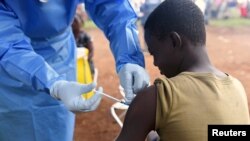Government authorities in the Democratic Republic of the Congo say 250 schools in North Kivu and Ituri provinces will open their doors to more than 82,500 children when the new school year begins Monday.
These areas are the epicenter of the latest Ebola epidemic in DRC. The Ebola virus is extremely contagious. It can spread quickly through direct contact with blood and other bodily fluids of infected people.
UNICEF says it is scaling up operations in the region to promote prevention measures. It says school principals and teachers will receive training on Ebola prevention and protection and on how to educate children on good hygiene practices to avoid the spread of the virus.
Spokesman Christophe Boulierac said UNICEF and its partners had reached more than 2 million people with Ebola prevention messages since the start of the outbreak on August 1.
"An increasing number of communities are now aware about Ebola and ... they know better how to prevent its transmission," Boulierac said. "The active involvement of concerned communities is key to stopping the spread of the disease. So, we are working closely with them to promote handwashing and good hygiene practices."
According to the latest World Health Organization estimates, there have been 116 cases of Ebola, including 77 deaths, in the DRC. UNICEF said children make up an unusually high proportion of people affected by the disease. It noted that 24 percent of confirmed cases were in people under age 24.
Boulierac said more than 150 psychosocial workers had been trained to help comfort children infected with the disease in treatment centers. He said they also would support children who were discharged as free of Ebola but were at risk of stigmatization upon returning to their communities.




